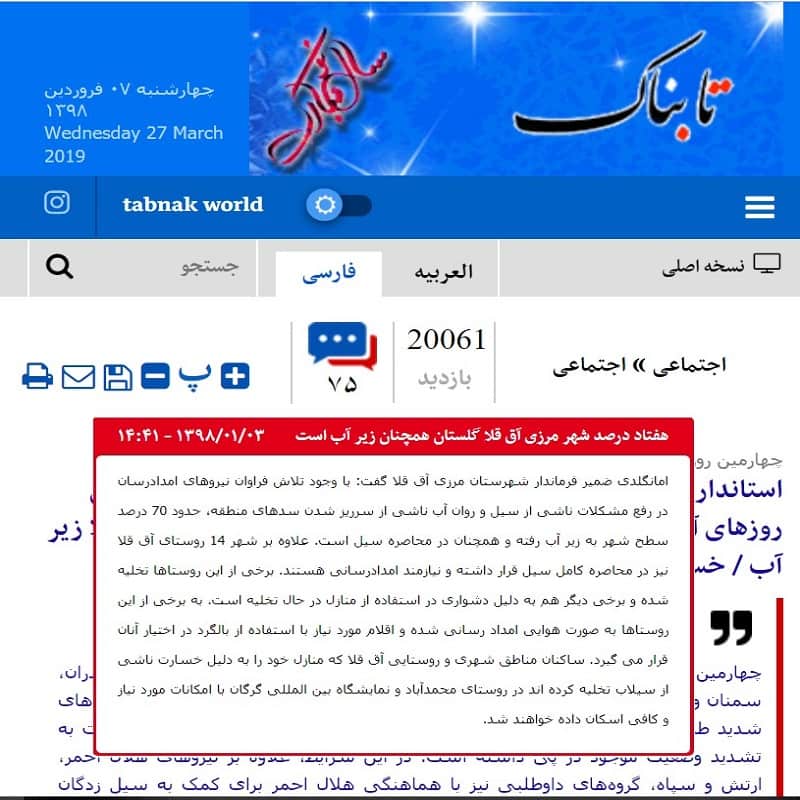The regime Officials left people alone in the face of the flood disaster in Iran
Since March 20, on the eve of the Iranian New Year, the flash flood disaster in Iran hit the Northern provinces, and in a few days, it swiftly covered many parts of the country.
Up to now, the flood disaster in Iran has wrecked the provinces of Golestan, Mazandaran, Fars, Lorestan, Khuzestan, Central, Chaharmahal and Bakhtiari, North Khorasan, Bushehr, Kermanshah, Hormozgan, Semnan, Sistan and Baluchestan, Zanjan, Isfahan, Khorasan Razavi, Alborz, and Isfahan.
Southern Khorasan, Ilam, and Tehran provinces are also suffering from heavy snow, cold and inundation.
The flood disaster, in the provinces of North Khorasan, Mazandaran and Semnan have caused severe damages, loss of lives and the inundation of villages.
Despite thorough censorship of the flood disaster news by the regime, the state-run media have admitted that 70 percent of Aq Qala, in Golestan Province, is surrounded by water, twelve villages around this city have been completely submerged, 7,900 houses in Golestan Province are severely damaged by the floods, and 23,000 locals are caught in the flood, leaving many people mourning their loved ones on New Year’s Eve.

The cause of flood disaster in Iran
Actually, the Iranian regime has left people vulnerable against natural disasters such as flood and earthquake, by destroying significant parts of forests and meadowlands, and by wasting the national wealth to export terrorism, to conduct clandestine nuclear projects to obtain bomb, and to carry on missile projects, in addition to promoting its suppressive apparatus.
The absence of the Governor of Golestan Province in such a state of emergency, flood disaster in Iran incited the popular anger. To cover-up the scandal, Abdolreza Rahmani Fazli, Rouhani’s interior minister, said that the Governor, Mannaf Hashemi, has gone abroad to look into family matters.
After visiting the flood-stricken regions, Ali Larijani, the Parliament’s chairman, in response to a woman who had lost everything, instead of showing any sympathy said in obscenity: “Yet you are still alive”.
The Iranian people are well aware that they cannot rely on the Mullahs’ regime. The record of the regime’s negligence on the dreadful condition of the earthquake-stricken cities, in Kermanshah Province, is speaking.
So, the only solution is in national unity to extend help to the flood-stricken people.
Mrs. Maryam Rajavi, the president-elect of the NCRI, sent a message to the Iranian people, in which she called for national solidarity and unity in face of the floods and the corruption of the mullahs:
“Rush to the aid of families affected by floods and show them your love and compassion. The mullahs have inflicted such a calamity on our people and cities. Let us build amid such disaster, our own solidarity and kindness, which is the greatest strength of our nation.
Let us build with our tears and sorrows a force of sympathy and unity against the mullahs. In these difficult days, rely on one another and let people rely on you. Take one another’s hand and let us come together to advance our plans for a free and prosperous Iran.”